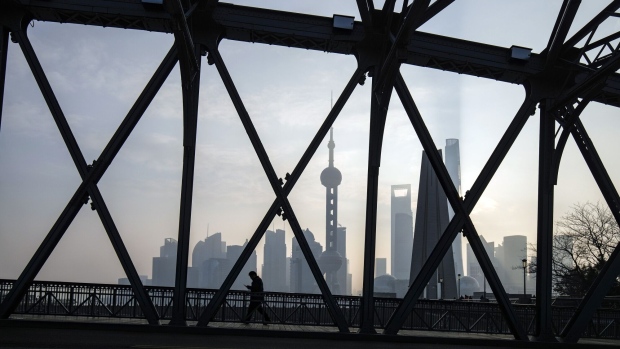Apr 10, 2024
Fitch Cuts China Outlook to Negative on Steady Rise in Debt
, Bloomberg News

(Bloomberg) -- Fitch Ratings revised China’s outlook to negative from stable, saying the government is likely to pile on debt as it seeks to pull the economy out of a real estate-driven slowdown.
Growing uncertainty about the outlook for the world’s second-biggest economy, amid Beijing’s drive to make growth less dependent on housing, “could keep debt on a steady upward trend,” Fitch said on Wednesday.
China’s government, which has been talking up the prospect of a turnaround in the economy, rapidly pushed back — saying the rating company failed to reflect the role of fiscal policy in shoring up growth, which helps to stabilize debt burdens. Financial markets were unfazed, with the yuan steady. China’s 10-year sovereign bond yield edged higher after trading little-changed for most of the day, as investors digested a report that policy banks are expected to sharply increase long-bond issuance.
“I think the agency got the logic backwards,” said Hao Hong, chief economist at Grow Investment Group. “There are good debts and bad debts. At this stage, if the government expands its fiscal budget deficit then it will actually improve the economic outlook.”
The Fitch announcement, which matched a similar one by Moody’s Investors Service in December, comes at a crucial time for China’s economy. In the coming week, the government is due to release some key indicators — including first-quarter growth — while the central bank will decide on a key loan rate. Financial markets are closely watching for clues about whether the economy has put the worst behind it, after some encouraging numbers for manufacturing and exports earlier this year.
Those data releases are what markets are focusing on, but the Fitch decision “may still hurt near-term market sentiment on China while the confidence level is already low,” said Xiaojia Zhi, an economist at Credit Agricole.
China’s public debt has risen rapidly over the past dozen years or so, as the government pumped funds into the economy in a bid to maintain the world-leading growth rates it posted over previous decades. Amid the property slump that’s now threatening to slow output, the government has outlined some new stimulus measures — like subsidies for households and businesses that want to upgrade appliances or machinery — and signaled that more may follow.
Public debt was close to 80% of gross domestic product as of the middle of last year, roughly double the level of the mid-2010s, according to the Bank for International Settlements. That’s well below many advanced economies like Japan and the US, though relatively high for an emerging market. Beijing’s own measure for government debt shows it at 56% of GDP at the end of 2023, up sharply since the pandemic.
Still, since China borrows in its own currency, it’s at no risk of the kind of debt crisis that’s hit other developing nations in the past, according to Andrew Freris, chief executive officer of Ecognosis Advisory Co.
“The only thing they need to be concerned about is their domestic situation,” he said. “That is much more easily doable because one-third of the banking system belongs to the government.”
Foreign ownership of China’s sovereign bond market remains small at just under 8%, according to Bloomberg calculations of the latest official data. That’s likely to cap any impact of the outlook change. Overseas investors have been net buyers of Chinese bonds since October, despite the outlook cut by Moody’s.
While Fitch lowered its outlook, it maintained China’s long-term foreign-currency issuer default rating at A+. It said one key point to watch out for is “the degree to which fiscal support reignites underlying GDP growth.”
Responding to Fitch, China’s Ministry of Finance defended its fiscal policy as supportive for growth, arguing the government will be able to “control its debt ratios well and save policy room for dealing with potential risks and challenges in future.”
“We regret Fitch’s cut to China’s credit outlook,” the ministry said in a statement released minutes after the Fitch announcement. The company’s ratings methods “failed to reflect on the positive role” of China’s fiscal policy in stabilizing economic growth as well as the macro leverage ratio “in an effective and forward-looking way,” it said.
The Ministry of Foreign Affairs also weighed in, with spokeswoman Mao Ning telling reporters at a briefing that “China’s determination and ability to safeguard its sovereign creditworthiness will not change” when asked about the Fitch move.
Officials from the ruling Communist Party have become more sensitive about negative commentary on the economy as they seek to bolster confidence and stem capital outflows. The country’s top leaders in December called for efforts to amplify bullish views, and officials have come up with new strategies including front-running disclosures on flattering data.
Fitch’s move likely won’t affect Chinese policy decisions such as the central bank’s announcement of the one-year medium-term lending facility — a key interest rate — which is due on April 15, said Frances Cheung, a rates strategist at OCBC. Nor, in the longer run, is it likely to lead to a rating downgrade, she said — thanks to “China’s taxation power and growth prospects.”
--With assistance from Yujing Liu, Tania Chen, Wenjin Lv and Colum Murphy.
(Updates with economist comment in 4th paragraph, foreign ministry in third-last.)
©2024 Bloomberg L.P.






